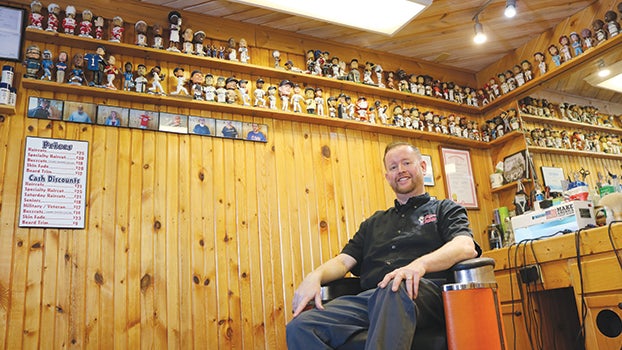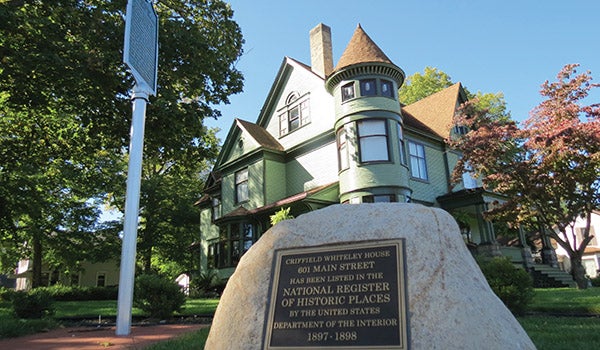Niles World War II veteran was a pioneer in military integration
Published 1:31 pm Thursday, February 23, 2017
In a lavatory at Gunter Field in Montgomery, Alabama, Private Gerry Hayden zips up his fly and walks over to the sink.
After washing and drying his hands, the U.S. Army airman pauses to straighten his tie in the mirror, the reflection staring back more a problem than most of his peers would ever face. Carefully studying his appearance as he maneuvers the fabric in accordance with military standards, Gerry is interrupted by a master sergeant more perturbed with another aspect of his looks.
“He was about half as tall as I was … and I probably outweighed this guy 35 or 40 to 50 pounds,” Gerry said. “And he come in and said, ‘What are you doing in here, boy?’ And he’s lookin’ up at me, calling me boy. … We never were men, we were always ‘boy.’”
Gerry explained to the Master Sgt. that he “came here to do what people do when they go to the latrine.” But the Master Sgt. didn’t appreciate Gerry’s wit and didn’t believe that he worked in the office, so he hauled him to the office of Major Forbes, Gerry’s commanding officer, to demand answers.
“The Army and the Navy — all branches of the service were segregated, back in those days,” Gerry said. “Matter of fact, there were no blacks in the Marine Corps, and very, very, very few in the Coast Guard.”
He explained that he was assigned as a clerk to a three-person processing office, where he tracked and processed the names of incoming and outgoing “would be pilots,” along with Major Forbes, of Tulsa, Oklahoma, and first lieutenant Kay Stanton, of Madison, Wisconsin.
The major reprimanded the Master Sgt. for harassing Gerry, but when he returned to work the next day Gerry found a utility closet — one with a huge double sink, mops, brooms and big canisters of wax — being converted into a restroom with a sign that read: “colored.”
Gerry immediately informed the major.
“He said, ‘Private Hayden, if I ever hear about you, or see you come outta there, or go in there, I’m gonna court martial you. This is a direct order: You will not ever use that,’” Gerry said.
Fortunately, it quickly became a nonissue, but it was clear that his presence on base ruffled feathers. Unfortunately, that would not be the only time Gerry would encounter racism and prejudice in the military, but neither was it the only base he would help integrate.
A STORIED PAST
Gerry has been blind since 2006 due to age and medical ailments, but he has seen a lot. With a smooth-as-silk baritone voice, the now 90-year-old recalls memories with such vivid clarity that those who listen in his Brentwood room are transported back in time.
After his World War II tour was up, Gerry would end up re-enlisting into the newly formed U.S. Air Force.
In 1950, Gerry became one of 50 African-American soldiers transferred from Mitchell Air Force Base to Otis Air Force Base in Cape Cod, Massachusetts, with secret orders to integrate the base.
He and the other men were briefed individually and collectively on their assignment.
“We didn’t go up there to start any trouble, but we weren’t to allow anybody to discriminate against us,” Gerry said. “We each had a telephone number to call, to go off-base to call [to report any racial discrimination], not to go through the base switchboard.”
When Gerry arrived, the Otis base commander had left his former drinking buddy from Oklahoma, a corporal, in charge. Gerry, a buck sergeant at the time, outranked the corporal and told him that he was assuming command, but the corporal refused to comply with his order. When the commander returned, Gerry brought the issue to his attention, but shockingly the commander supported his buddy.
In an inspired moment, Gerry asked him if he would be willing to put it in writing.
“The idiot put out a memo,” Gerry said with a laugh. “I had a copy of it in my wallet!”
A week later, a planeload of full-bird colonels, master sergeants and civilian lawyers showed up at Otis.
“They came down and woke the base commander up,” Gerry said. “Next thing ya know, they called on me — woke me up and got me outta the barracks.
“They reamed his butt, boy. They didn’t bust him. They could have, they coulda busted him. … When [the base commander] applied [to Officer Candidate School] he was a private first class, and he would’ve reverted to that.”







